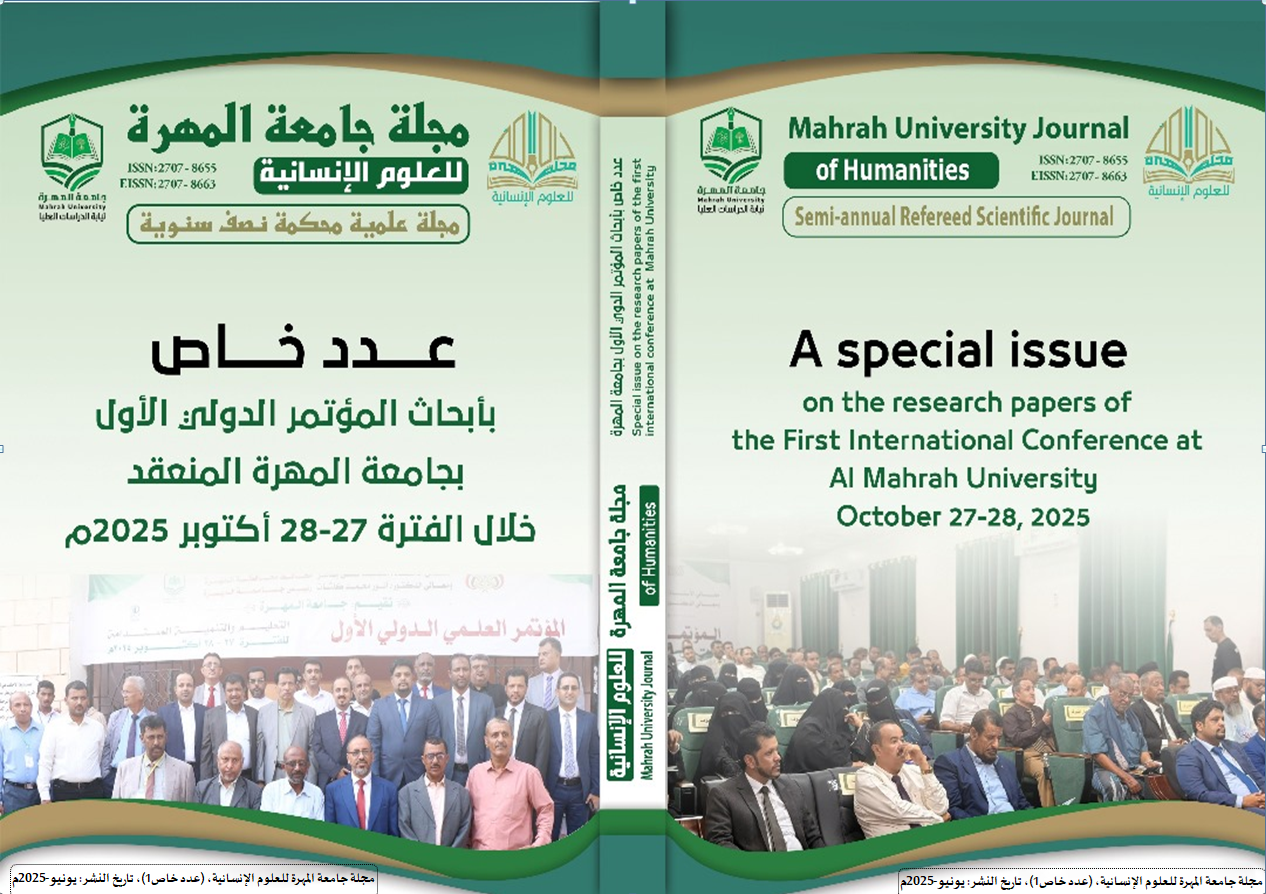The Degree of Contributions of Faculty Members at Yarmouk University to Achieving Sustainable Development Using Artificial Intelligence
DOI:
https://doi.org/10.71311/.v6iS1.194Keywords:
Artificial Intelligence, Sustainable Development, Faculty, Yarmouk UniversityAbstract
The study aimed to identify the degree of contributions of faculty members at Yarmouk University to achieving sustainable development using artificial intelligence. The study followed the descriptive survey method, and the study used a questionnaire consisting of (17) items in collecting its data, and it consisted of two axes: the application of artificial intelligence, and the role of Yarmouk University in achieving... Sustainable development, and its validity and consistency have been confirmed. The study sample consisted of (67) male and female students who were selected randomly. The results of the study showed that the degree of contributions of faculty members at Yarmouk University to achieving sustainable development using artificial intelligence from the point of view of the study community was (large), as the general arithmetic average was (3.75), and that the field of “application of artificial intelligence” was (medium), The arithmetic mean was (3.56), and the field “The role of Yarmouk University in achieving sustainable development” was (large), and the arithmetic mean was (3.95). The results of the study also showed that there were no statistically significant differences between the average estimates of the study sample regarding the degree of contributions of faculty members at the University. Yarmouk achieves sustainable development using artificial intelligence due to the gender variable (male, female).
The researchers also recommended "adopting the application of artificial intelligence to achieve sustainable development while providing all the material capabilities, tools and means that work to constantly develop and update information and technology programs and applications, and involving faculty members in developing practical programs to introduce sustainable development and mechanisms for promoting it."
Downloads
References
براهيمي، نادية وسنوسي، علي. (2017). دور الجامعة في تحقيق التنمية البشرية المستدامة –دراسة حالة، رسالة دكتوراة غير منشورة، جامعة محمد بوضياف بالمسيلة، الجزائر.
الحارثي، ابراهيم بن أحمد. (2014). تجويد التعليم باستخدام المعايير وإدارة الجودة الشاملة. الرياض: مكتبة الشقري.
دهان، محمد وزغاشو، ومريم. (2018). دور التعليم في تحقيق التنمية المستدامة. الملتقى الدولي حول الجزائر وحتمية التوجه نحو الاقتصاد الأخضر لتحقيق التنمية المستدامة، جامعة عباس لغرور، خنشلة.
سلامي، منيرة وبيه، إيمان. (2013). المؤسسات الصغيرة والمتوسطة كأداة للتمكين الاقتصادي للمرأة في الجزائر، أطروحة دكتوراه غير منشورة، جامعة قاصدي مرباح، ورقلة، الجزائر.
شرتيل، نبيلة اندش، حميدة. (2020). دور جامعة مصراتة في تفعيل التنمية المستدامة من وجهة نظر أعضاء هيئة التدريس فيها، ورقة مقدمة في المؤتمر العلمي الرابع والثاني لقسم التربية وعلم النفس "التعليم العالي الواقع والطموح".
الصبحي، نور عبد العزيز، والفراني، لينا أحمد. (2020). الذكاء الاصطناعي في التعليم العالي بالمملكة العربية السعودية. المجلة العربية للعلوم التربوية والنفسية، كلية الدراسات العليا التربوية، جامعة الملك عبد العزي، 4 (17).
الصويعي، هند والمغربي، صباح. (2017). أثر ممارسة أبعاد الجودة الشاملة ففي تحقيق التنمية المستدامة من وجهة نظر أعضاء هيئة التدريس بكلية الآداب والعلوم المرج جامعة بنغازي، مجلة آفاق اقتصادية، 8 (15)،41-68.
عزي، الأخضر وإبراهيمي، نادية. (2010). دور الجامعة في تحقيق التنمية المستدامة (دراسة لواقع الجامعة الجزائرية)، المؤتر السادس التعليم العالي مأخوذ العربي الضمان جودة.
فراحتية، كمال. (2018). التنمية المستدامة، مجلة الأستاذ الباحث للدراسات القانونية والسياسية، عدد 11.
قطامي، سمير. (2018). الذكاء الاصطناعي وأثره على البشرية. المجلة الافكار نحو ثقافة مدنية، (357)، 13-40.
القميزي، حمد. (2015). دور محتوى مقررات مناهج العلوم في تنمية مفاهيم التنمية المستدامة لدى طالب المرحلة المتوسطة بالمملكة السعودية. المجلة المصرية للتربية العلمية، 18(2)، 185–215.
مقاتل، ليلى، وحسني، هنية. (2021). الذكاء الاصطناعي وتطبيقاته التربوية لتطوير العملية التعليمية. مجلة علوم الإنسان والمجتمع، 10 (04)، 109-127.
المقيطي، سجود احمد. (2021). واقع توظيف الذكاء الاصطناعي وعلاقته بجودة أداء الجامعات الأردنية من وجهة نظر أعضاء هيئة التدريس. جامعة الشرق الأوسط كلية العلوم التربوية، رسالة ماجستير، عمان، الأردن.
الود، حبيب وبلاهدة، حنان. (2014). التنمية المستدامة: صورة للارتباط الحتمي للبيئة بالتحولات الاقتصادية والاجتماعية، مجلة الدراسات والبحوث الاجتماعية، العدد السابع، 206-190.
اليونسكو (2017). تقرير الاستعراض الطوعي الوطني للأردن حول أجندة التنمية المستدامة 2030.
https://jordan.un.org/ar/42127-tqryr-alastrad-altwy-alwtny-llardn-hwl -
ثانياً: المراجع الأجنبية:
Badat, S. (2009). The Role of Higher Education in Society: Valuing Higher Education, Hers - SA Academy, University of Cape Town Graduate School of Business.
Gem Report, (2020). Inclusion and Education. Available: https://en.unesco.org/gem-report

Downloads
Published
How to Cite
Issue
Section
License
Copyright (c) 2025 د. أثير حسني الكوري ، د. علي كاظم السندي

This work is licensed under a Creative Commons Attribution 4.0 International License.
Copyright and Licensing
copyright is retained by the authors. Articles are licensed under an open access Creative Commons CC BY 4.0 license, meaning that anyone may download and read the paper for free. In addition, the article may be reused and quoted provided that the original published version is cited. These conditions allow for maximum use and exposure of the work.

